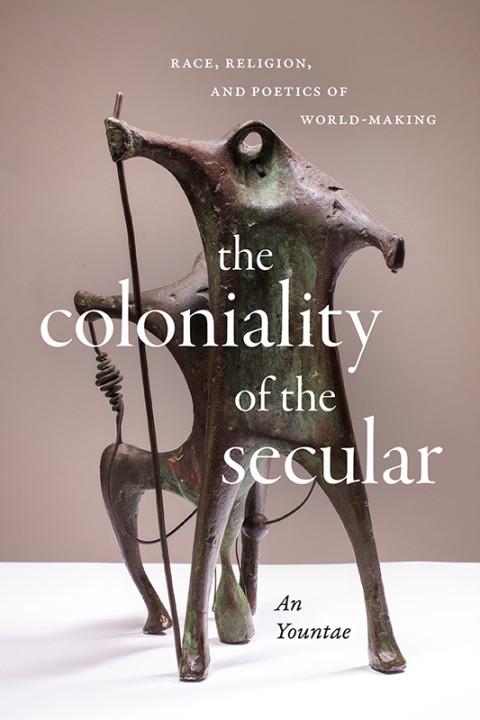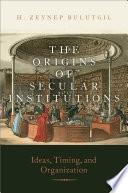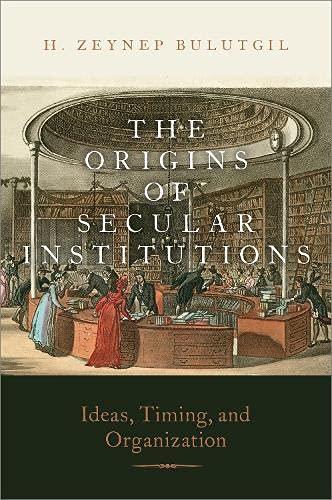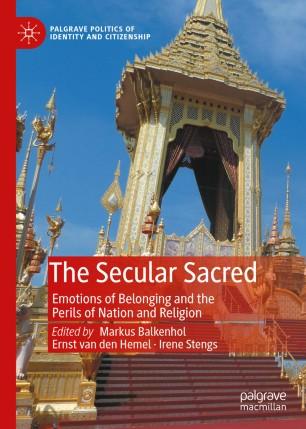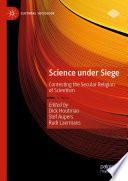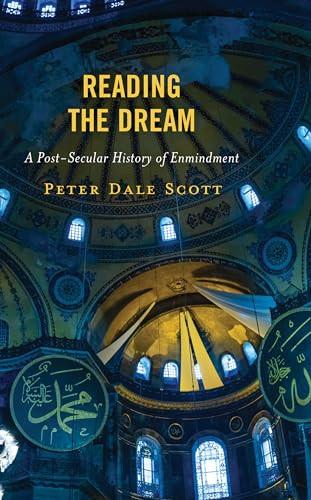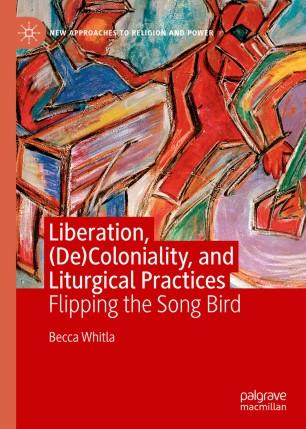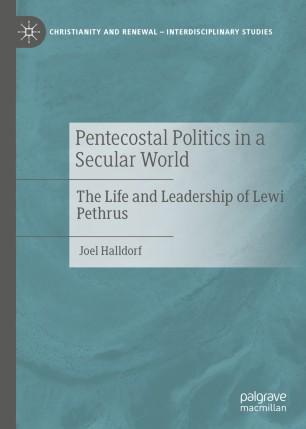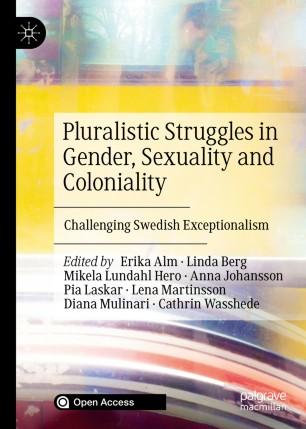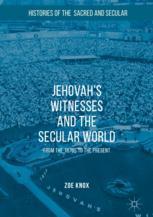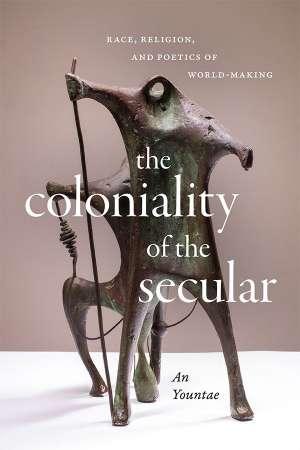T e Coloniality of the Secular
An Yountae
Race , Religion , and Poetics
of W orld - Making
duke university press Durham and London 2024
© 2024 Duke University Press
All rights reserved
Printed in the United States of America on acid-free paper ∞
Project Editor: Bird Williams
Designed by A. Mattson Gallagher
Typeset in Garamond Premier Pro by Westchester Publishing Services
Library of Congress Cataloging-in-Publication Data
Names: An Yountae, author.
Title: Te coloniality of the secular : race, religion, and poetics of world-making / An Yountae.
Description: Durham : Duke University Press, 2024 . | Includes bibliographical references and index.
Identifers: LCCN 2023016231 (print)
LCCN 2023016232 (ebook)
ISBN 9781478025108 (paperback)
ISBN 9781478020127 (hardcover)
ISBN 9781478027096 (ebook)
Subjects: LCSH : Postcolonial theology. | Religion and politics. | Racism—Religious aspects—Christianity. | Decolonization— Religious aspects. | Postcolonialism—Religious aspects— Christianity. | Religion—Philosophy. | Imperialism. | Hispanic American theology. | BISAC : RELIGION / General | PHILOSOPHY / Religious
Classifcation: LCC BT 83 593 A 5 2024 (print)
LCC BT 83 .593 (ebook)
DDC 201/.72 —dc23/eng/20231106
LC record available at https://lccn.loc.gov/2023016231
LC ebook record available at https://lccn.loc.gov/2023016232
Cover art: Joaquín Roca Rey, Study Figure for Unknown Political Prisoner, 1952 . Bronze, 13 x 9 x 10 inches. Collection
OAS AMA | Art Museum of the Americas. Artist’s permission courtesy of Archivi Joaquín Roca Rey.
vii Acknowledgments
1 Introduction A Decolonial Teory of Religion part i . genealogies
25 1.Modernity/ Coloniality/Secularity Te Cartography of Strug gle
57 2.Crisis and Revolutionary Praxis Philosophy and Teology of Liberation
Contents
part ii . poetics
97 3.Phenomenology of the Political Fanon’s Religion
113 4 . Phenomenology of Race Poetics of Blackness
139 5. Poetics of WorldMaking Creolizing the Sacred, Becoming Archipelago
177 Conclusion 181 Notes 205 Bibliography 223 Index
Acknowledgments
I would like to thank the College of Humanities at California State University, Northridge (csun ) , for the various grants that supported the writing of the book. I also want to thank Rick Talbott and Mustafa Ruzgar, the chairs of the Department of Religious Studies, for their continuous support during the process. Te College of Humanities Research Lab helped me advance initial research for the project with the help of students who participated in the lab during 2018 and 2019. Special thanks to my research assistants, Menen Basha and Michael Meeks. In many ways, the initial questions and concerns that inspired the project were born at the National Endowment for the Humanities Summer Institute, which took place at Macalester College in 2017. I thank James Laine and everyone who participated in the institute for helping me deepen my interests on the issue of method and theory for the study of religion.
Tanks to the many conversations I had with Jefrey Robbins, Mayra Rivera, Eleanor Craig, and Santiago Slabodsky, what was once a vague idea in my head evolved into a concrete project. Tose who read parts of the book and ofered critical feedback enriched the writing process tremendously. I thank Mayra Rivera, Rafael Vizcaino, Justine Bakker, Benjamin Davis, and Eleanor Craig for reading the chapters. I’m also greatly indebted to Beatrice Marovich who read the entire manuscript and ofered feedback. I was
extremely lucky to share part of this process with Beatrice (also writing her own book), whose friendship and support was invaluable to the journey.
Tis book was written in conversation with many people whom I encountered at various academic events. I want to thank the following people and institutions for inviting me to share diferent parts of this work: Delia Poppa and Vincent Lloyd (Villanova University), Anya Topolski (ReligionRace- Secularism Network), Alda Balthrop-Lewis and David Newheiser (Australian Catholic University), Joshua Ramey (Haverford College), Rafael Vizcaino (DePaul University), Beatriz Cortez and Douglas Carranza (Central American Studies Symposium at csun ), Lucie Robathan (Concordia University and McGill University), Nicolas Panotto (Otros Cruces), Shela Sheikh (International Symposium in Phenomenology), Jefrey Robbins ( Westar Institute), Roberto Sirvent (Political Teology Network), and the Kroc Institute at Notre Dame University. I also remain grateful to the following interlocutors who helped me shape my ideas through the years: Atalia Omer, David Kline, Catherine Keller, Filipe Maia, Noelle Vahanian, Karen Bray, J. Kameron Carter, and Clayton Crockett. Finally, I thank the editorial team at Duke University Press. I’m particularly grateful to the editors, Sandra Korn (who’s now joined Wayne State University Press) and Courtney Berger, for shepherding the project with great care and love.
Where are your monuments, your battles, martyrs?
Where is your tribal memory? Sirs, in that gray vault.
Te sea. Te sea has locked them up.
Te sea is History.
First, there was the heaving oil, heavy as chaos; then, like a light at the end of the tunnel, the lantern of a caravel, and that was Genesis.
Ten there were packed cries, the shit, the moaning.
derek walcott, “ Te Sea Is History”
Introduction
A Decolonial Teory of Religion
Hailed as a landmark text in twentieth-century anticolonial thinking, Aimé Césaire’s Notebook of a Return to the Native Land (Cahier d’un retour au pays natal) is an epic poem that denounces the devastating historical reality of colonial violence. Written in a caustic tone, the poem calls for the old colonial order, with its “Aged poverty rotting under the sun, silently . . . [that points at] the awful futility of our raison d’être,” to be destroyed. Te call for abolishing the existing order ushers in, at the same time, the possibilities of imagining a new order. As the Saint Lucian poet Derek Walcott observes, Césaire’s poignant cry is preserved as a poetic sensibility, a “sensibility of walking to a New World.”1 Discussing the diferences between the Guadeloupean poet Saint John Perse and Aimé Césaire, Walcott brings attention to the shared sensibility of these two Caribbean poets. Despite their diferent views of the colonial Antilles, Walcott writes, “ Te deeper truth is that both poets perceive this New World through Mystery.”2 If religion, in its dominant
form, has historically accommodated systems of colonial and racist ideology, these poets signal how there are unnamable experiences, afective registers, and imaginaries—ofen akin to religion—that play an instrumental role in undoing the unjust order and envisioning a new world. Tese registers elude words and concepts. Te poets ofen strug gle to fnd a name for them. With the term religion not being an option, they recurrently turn to the fgure of the sacred. In their view, mystery or the mystical does not signal a simple retreat to the inner world (or the otherworldly) but the undoing of the self that necessarily involves the dissolution of the old world and the rebuilding of a new world, new modalities of being and relationality.
Te Coloniality of the Secular probes the wide-reaching infuence of religion that constitutes the historical sediments of culture and mobilizes sociopolitical institutions, norms, and practices. We witness religion’s broad implication in the world not only as a system of power that sanctions violence but also as the driving motor behind counterhegemonic forces that seek to build a new order. I want to bring attention to the latter, because the various alternative fgures substituting the category of religion are ofen mislabeled as secular iterations of the sort, distinctive from religion. Te presumably secular thinkers I read in the following do not simply turn away from religion, nor do they hastily attempt to rehabilitate it as a countersecular recipe. Tey do, however, signal that their decolonial ideas and visions persistently attend to the eforts to reconceive the sacred, ofen regardless of their intention and awareness. I pay close attention to the underelaborated link between these thinkers’ decolonial visions and their eforts to resignify the sacred. In doing so, I seek to incorporate the work of decolonial thinkers, who were heretofore unconsidered, into the archive of the study of religion.
Césaire’s work points to the complex imbrication of religious and secular sediments that jointly form the historical layer of colonial modernity in the Americas. Teorizing colonial modernity requires thinking beyond the boundaries set by binary categories of the secular and the religious. In both Discourse on Colonialism and Notebook, Césaire draws on numerous theological metaphors to diagnose colonialism as symptomatic of political theology. Te deep roots of colonialism, in Césaire’s analysis, lay in the religious foundation underpinning the modern West. For Césaire, religion anchors the genesis of the modern colonial world by facilitating the dialectical sublation of the colonial other.3 If the colonial world is predicated on a certain political theology, countercolonial discourse must attend to the problem of religion underpinning the colonial order. In this sense, Césaire’s
decolonial poetics carries signifcant religious dispositions. Te second half of Notebook displays a sudden change of tone in which the narrative takes an overtly religious character. Te progression of the poem suddenly shifs into a confession and a manifesto in which Césaire claims his negritude to be an incorrigible dissent of the Christian- colonial worldview: “I declare my crimes and that there is nothing to say in my defense. Dances. Idols. An apostate.”4 Negritude and the colonial abject signify refusal: a refusal of the Christian-colonial world and its metaphysics. However, the reconstruction of a countercolonial order does not take a secular path for Césaire. Bringing down the colonial political theology calls for a counterpolitical theology. Te remainder of the poem walks the reader through Césaire’s ritual of recreating himself (negritude) in which the newly cast self eventually displaces the metaphysical edifce of the old colonial order. Tat is, Césaire’s poetic journey of becoming, his poiesis, takes place through the reconstruction of the symbolic and religious foundation underlying the colonial order. Césaire’s decolonial poetics, aimed at theorizing of the new being, winds up, in a way, reconceptualizing religion.
Aside from Césaire, many important thinkers invested in decoloniality have suggested that we must traverse the secularist categories that prevent us from reaching down to the deep reserve of aesthetic, spiritual, and afective sensibilities that shape the intellectual traditions of the Americas. Te works of Aimé Césaire, Derek Walcott, Sylvia Wynter, Édouard Glissant, Enrique Dussel, and Gloria Anzaldúa all complicate the boundaries of the religious and the secular for theorizing decoloniality. W hat happens when theory operates and circulates through secularist categories that disregard the religious foundation of colonial modernity? W hat if the various theories of decoloniality are signifcantly more informed by religious imaginations than we ofen think?
Commenting on postcolonial theory and religion, Nelson MaldonadoTorres notes that, despite its important contribution to the study of race, modernity, and colonialism, postcolonial theory “has tended to side with modern secularism in its characterization of religion,” thus privileging “ Tird world secular authors.”5 Teory is ofen associated with secular categories and worldviews. As Wendy Brown, Judith Butler, and Saba Mahmood write in their preface to Is Critique Secular?, the common assumption that critique is secular presupposes that “the secular worldview is altogether diferent from a religious one” when in reality “secularism is inherently generative and suffused with religious content.”6
Te diferent voices emerging in the Americas against colonial modernity trouble the binary categories of the religious and the secular. Such categories impede a fuller grasp of the breadth and depth of both decolonial thinking and religion—including the ways they might be mutually co-constitutive. Discussing the genealogy of Caribbean poetics, Sylvia Wynter comments on the sense of Antillean history the Martinican poet and philosopher Édouard Glissant grapples with. Wynter notes that, for Glissant, this history is “nothing less than the strug gle against the imposed role, that of the lack of being to the frst secular model of being in human history.”7 Caribbean poetics, as Wynter sees it articulated by Glissant, signals the refusal of the colonial-secular iteration of the human. She traces this tradition of decolonial poetics back to Césaire, whose Notebook “was the founding counterdiscourse of the Antilles.”8 Both Fanon’s and Glissant’s works “were the continuation of the act of poetic uprising against” the imposed mode of being in which the Black population represents ontological lack—as the mirroring other of the modern secular mode of being.9 Wynter and other Caribbean thinkers commonly point to coloniality’s collusive link with the secular. W hat happens when theory, the theory that articulates new being and new order against colonial modernity, is intrinsically critical of the secular? And what if the re-envisioning of the new order entails a spiritual dimension? W hereas contemporary scholarship has been challenging the “myth” of the secular and the secularist categories that reduce religion to a narrow concept, religion is still ofen misconceptualized by many scholars who theorize race, modernity, and colonialism.
Te Coloniality of the Secular explores how decolonial theory can open ways to theorize religion in the Americas. It locates a genealogy of critical inquiries that have challenged the normative and ofen violent doctrine of the secular in the (post)colonial Americas. W hereas secularism’s connection to colonialism has recently become a popular area of academic inquiry, the conceptual category of the secular’s role in the constitution of coloniality has been rather underattended—in both the study of religion and the feld of decolonial theory more broadly. Te tight linkage between the secular and the concept of religion, race, and coloniality, I submit, is crucial for theorizing modern religion.
Te purpose of this book is twofold. First, it places religion at the center of decolonial scholarship by reading religion as one of the constitutive
elements of (de)coloniality. Many contemporary decolonial theorists acknowledge religion’s place in decolonial thinking, and some elaborate on it to a certain extent. As I show in chapter 1, many of the twentieth- century thinkers who inspired contemporary decolonial scholarship (José Carlos Mariátegui, Gloria Anzaldúa, Gustavo Gutiérrez, Enrique Dussel, Aimé Césaire, Sylvia Wynter, to name a few) viewed religion as a vehicle of both colonial politics and the decolonial other wise. However, this connection has not yet been adequately explored in contemporary conversations about decolonial theory. Tis is because religion’s substantial role in the historical trajectory of modernity/coloniality is ofen obscured by secularist epistemic frameworks, ofen resulting in an awry understanding of religion shared by many outside the feld of the study of religion. I pay particular attention to the unmarked predominance of the secularist framework in the academic study of religion that in a way reinforces the Eurocentric episteme. Undoing the intricate tie between modern religion (the secular), race, and coloniality remains an important task yet to further develop. Tis book is an attempt to reconceptualize religion and clarify its relation to (de)coloniality. I do not ofer a prescriptive redefnition of what religion is and what it is not, but I interrogate the narrow conception of religion that misplaces it in both colonial relations of power and various iterations of decolonial thinking. Reconceptualizing religion in broader terms allows me to attune to vital spiritual and afective dynamics fueling decolonial thinking, such as the fgure of the sacred that conjures decolonial imaginations in the works of the various poets named above.
Second, Te Coloniality of the Secular seeks to demonstrate what decolonial thought ofers to the study of religion, race, and coloniality in the Americas. It discusses the challenges and insights that decolonial thought provides when considering questions about method, texts, sites, and conceptual frameworks. In other words, Te Coloniality of the Secular explores the possibility of a decolonial theory for the study of religion by insisting on the need to consider the Americas and the transatlantic historical experience as primary sites for theorizing modern religion.
Te study of non-Western religions has been a vital area of inquiry in the study of religion since its founding in the nineteenth-century European academy. But rarely have these studies been crafed with theories and conceptual frameworks produced in the global south. Te conceptual and theoretical tools of investigation in modern and contemporary academic discourses are usually reserved for the global north. Teory belongs to the West. In Out of
the Dark Night, Achille Mbembe shares his observation of the current geography of reason sustained by “a Yalta-like division of the world between the global North, where theory is done, and the ‘Rest,’ which is the kingdom of ethnography.”10 Te primary function of marginalized geographies in this imperial cartography of reason is “to produce data and to serve as the test sites of the theory mills of the North.”11 Mbembe’s analysis resonates with Dipesh Chakrabarty who, more than twenty years ago, pointed out the inherently exclusive Westernness of theory. In Provincializing Europe, he writes, “Only ‘Europe’ . . . is theoretically (that is, at the level of the fundamental categories that shape historical thinking) knowable; all other histories are matters of empirical research that feshes out a theoretical skeleton that is substantially ‘Europe.’ ”12 Western theory—that which is presented simply as “theory”—is understood to transcend locale (place).
W hen considering Western theory’s co-constitution or entanglement in the formation of colonial modernity, it is necessary to reconsider its capacity to disarticulate the complex knots of coloniality. Teory, articulated in its secular-colonial iteration, presents us with various inadequacies for aptly grasping the depth and the extent of diverse forms of knowing that precisely contend the very secular-colonial foundations of European modernity. Numerous thinkers outside or at the margin of colonial modernity who articulated a diferent world (future) did so through conceptual frameworks that are ofen entirely diferent from the current Western framework that dominates global knowledge production. Te vital geohistoric diferences of these heterogeneous narratives are ofen subsumed by the normative conception of theory and its universalizing categories. Te notion of religion and the concomitant category of the secular are among the many problems that surface in contemporary academic conversations, which ofen tend to apply homogeneous theories and methods to capture radically heterogeneous worldviews and forms of knowing.13 Rather than taking the secularity of theory (hence, its coloniality) for granted, we need to reconsider theory in its relation to religion’s place in the confguration of colonial modernity, including the production of its own presumably secular sciences that inform theory.
Te Coloniality of the Secular probes the presumed secularity of theory. Here, I draw a distinction between secularism/religion as a lived experience, and the conceptual category of the secular/religion that informs the modern Western epistemic framework. Religion as a lived experience has persistently inspired anticolonial thinking in various communities of the (pre)colonial Americas, despite the rise and the rule of secularism. Both Indigenous and
Afro- Caribbean intellectual traditions, for instance, have staunchly resisted Western binary categories that segregate religion from the realm of the intellect that mobilizes thinking and imagination. However, the dominant Western epistemic framework that informs both colonial knowing and, to some extent, contemporary decolonial theory tends to subsume the vibrant reality of these various religious (spiritual-poetic- creative) sensibilities to secularist categories. Of course, the feld of decolonial theory is vast in its scope and orientation. Te term decolonial theory, or decolonial thought, carries, in this sense, a certain risk of generalization. I must acknowledge that Te Coloniality of the Secular is particular in its scope and approach. I do not, by any means, seek to represent the vast geography of decolonial thinking in its entirety, nor do I attempt to essentialize particular discourses I engage here as the only brands of decolonial thought.
W hile this book broadly aims to tackle issues of race, coloniality, and the categories of religion/secular in the Americas, the key thinkers who take the central stage are mostly from the Caribbean intellectual tradition. Also important for my reading is the place of the South American tradition of philosophy and theology of liberation. Overall, the primary analytic framework I employ is based on the discourses that emerged from the conversations between Latin American thinkers and US-based Latin American theorists, ofen dubbed as “the decolonial turn” or the analytic framework of modernity/coloniality. In chapter 1, I ofer a broader map that points to the diverse genealogies of decolonial thought stretching across the Americas beyond the particular conversations I focus on in the remainder of the book.
Te modern notion of religion can be viewed as a product of the emergence of modernity/coloniality, with the secular being the mirror twin of modern religion that welds together the two ends of modernity/coloniality. As numerous important works have recently suggested, the modern categories of race and religion are mutually co-constitutive.14 Te invention of race—as a constitutive element of coloniality—cannot be articulated apart from the history of the emergence of the concept of religion as the traditional lines demarcating ontological diference between people shifed from religious language (religious diference) to the secular language of scientifc reason (racial diference).15 In other words, Europe’s colonial imaginary was constituted by the newly emerging racial categories that now replaced religion’s role of drawing lines of hierarchical diference between diverse populations. From the ffeenth-century Spanish Inquisition to the sixteenthcentury Valladolid debates, from the missionary activities in the New World
to the rise of comparative study of religion in nineteenth-century Europe, religion—and its twin mirror, the secular—has been instrumental in marking of ontological diferences along the racial lines that aligned with Europe’s colonial interests.16 Put diferently, the co-emergence of race and religion in modern Europe required its enterprises in the colonial frontier in which the control (production) of race and religion was crucial for colonial governance. Te works of Willie Jennings and Nelson Maldonado-Torres explore the European construction of religion in tandem with race during the colonial encounters in the Americas by examining early colonial writings and reports about Indigenous religions.17 Te basic premise for my claims here lies adjacent to their works. However, Te Coloniality of the Secular takes a diferent route. Many of the materials I engage with are not religious but are “secular” sources. My concern is not limited to the historical sites and archives of knowledge inscribed in precolonial or colonial religions. Rather, my interest stretches to the constructive visions and insights ofered by anticolonial thinkers who were writing from outside the parameters of religion. I suggest that these secular-political texts complicate the problematic binaries reifed by the modern concept of religion. My reading demonstrates that these thinkers viewed religion as an important metaphysical axis that sustains the colonial worldview and order—despite the alleged secularity of coloniality. Many of these thinkers viewed secular modernity as an ideological platform of coloniality. I demonstrate that their critical reading of colonial modernity harbors important critiques of religion. In their view, the normative universal of secularism imposed by the West signifes, essentially, a transmutation of the hegemonic Western (Christian) worldview. Such critical reading of religion’s place in colonial modernity is evident in Wynter’s oeuvre, which helps us draw the lines of connection between, race, religion. and colonial modernity in the works of various twentieth- century Caribbean thinkers. Interestingly, she includes Frantz Fanon (along with Glissant) in a Cesairean genealogy of the poetic revolt—a revolt against the imposed violence of the secular. Wynter’s reading might seem to confict with the widespread perception of Fanon as a staunch secular humanist. However, as my reading shows in chapters 3 and 4 , Fanon’s relationship with religion is much more complex and complicated than we ofen realize. It is precisely the various secularist categories informing theory—which at times shape Fanon’s own views—that lead us into an awry reading of religion’s place in Fanon’s work. My reading shows that, while Fanon seems to denounce religion and ofen pits religion
against decoloniality, his critique of religion somehow reveals his attachment to the sacred, rather than its renouncement. Like Césaire, Fanon understood that the re-creating of the self (and of a new order) involves resignifying the symbolic and religious grammar that ratifes the existing order. In this sense, Fanon’s decolonial poetics, ofen associated with secular humanism, winds up reconceptualizing religion.
Te Coloniality of the Secular probes the co-constitutive linkage between modernity/coloniality/secularity. To unpack modernity/coloniality/secularity, I navigate a diverse range of academic discourses that span across disciplines. Tese conversations are not necessarily all connected or adjacent to each other. Bringing these diferent discourses together, however, allows me to zoom in to the important point of connection that cuts across the compound modernity/coloniality/secularity.
Decolonial theorists call for careful reconsideration of the Eurocentric nature of universalizing epistemic frameworks informing knowledge and knowledge production.18 Various scholars working from within this tradition take Aníbal Quijano’s notion of coloniality of power as the departing point of their analyses. Te notion of coloniality highlights the polychronic nature of power operative in colonialism. Coloniality manifests beyond the historical institution of colonialism. Colonialism is tied to the specifc historical event and period; coloniality outlasts decolonization.
Te decolonial turn has in many ways invigorated the critical study of religion not only by carrying on the critical projects advanced by postcolonial studies but also by revisiting and refning many of the key theses that postcolonial studies has advanced. Acknowledging postcolonial theory’s impor tant contributions, Latin American—and US-based decolonial theorists point out some key diferences that distinguish the two. First, whereas postcolonial theory’s focus tends to be on nineteenth- and twentieth-century European colonialism in Asia and Africa, decolonial theory uses the ffeenth-century colonial encounter in the Americas as the primary point of reference. Te former renders colonialism a derivative of modernity while the latter views colonialism (or, rather, coloniality) as constitutive of modernity. Second, decolonial theorists point out postcolonial theory’s penchant for European theory. Countercolonial thinking and discourse have existed all along since the frst colonial encounter. When considering the importance of knowledge and knowledge production
in the formation and the circulation of coloniality, grounding countercolonial discourse in European theoretical framework presents visible limitations.19
Charting the connection between religion and decoloniality is important not only for the study of religion but also for those who investigate coloniality across interdisciplinary boundaries. Tat religion’s place is ofen omitted or reduced in these academic conversations of decolonial theory indicates that the broad extent of religion’s role—however unmarked and understated it may be—in the formation of the colonial regime of power and knowledge has been underattended. As Sylvester Johnson comments in Afican American Religions, 1500–2000, the lack of interest that various theories of modernity show in religion indicates a failure to understand religion’s constitutive role in the formation of the mechanism of power.20 Briefy speaking, the failure to closely probe the link between religion and decoloniality leaves three large blind spots in the ongoing conversations about power and coloniality in the Americas.
First, many writings of “secular” decolonial thinkers ofen hint at nuanced readings of religion beyond the critique of prevalent colonial religions, as I show through the book in conversation with various Caribbean thinkers (Aimé Césaire, Frantz Fanon, Sylvia Wynter, Édouard Glissant). Te generative political visions that these thinkers ofer are ofen intertwined with their attempt to reconfgure religion, or the sacred. In other words, there are diverse forms of religion-making that take place in and through various alternative forms of decolonial critique and imagination. Tese diferent forms of decolonial thinking and imagination invite us to reconceptualize the rather narrow notion of religion (as well as the concept of the secular) that pervades many academic conversations.
Second, this aforementioned failure underestimates the role of religion (Christianity, to be more specifc) that underpins the secular colonial order. Numerous scholars have already pointed out the inextricable connection between colonialism and secularism by exposing the mechanism of colonial governance and enterprises informed by religious (Christian) worldviews and agendas.21 But the presence of religion in the colonial Americas extends far beyond the well-known history of Christianity’s missionary activities. Since the frst colonial encounter, religion has served as the metaphysical backbone of coloniality, not just as an imposition of political structures and cultural norms, but as a cosmological rupture.22
Tird, a long tradition of anticolonial resistance and critique emerging from religious communities across the Americas has been overlooked.
W hen these movements are studied, the full depths of their signi fcance are not entirely grasped without properly unpacking the complexities inscribed in (anti)colonial religions. More impor tant, the complex relation between religion and (coloniality of) power raises a more fundamental question regarding the emergence of modern religion. Underlying the historical phenomenon of the interaction between religion and coloniality in the Americas is perhaps the problem of the category of religion, which was conceived in tandem with the emergence (invention) of race in the global colonial matrix of power.23
Te complex relationship between the categories of religion, the secular, and the problem of power has been articulated by many scholars in the feld of the study of religion. Charles Long has articulated lucidly the intricate connection between the construction of religion as a category and the reality of conquered and marginalized people. Te signifcation (invention) of the former is linked with the signifcation of the latter as the process involves the reifcation of certain oppositional norms (e.g., rationality versus irrationality) as defning characteristics of each group that is the West and its “Other.”24 In his genealogical study of the modern category of religion, Talal Asad situates the modern category of religion in the historical trajectory of the emergence of Western liberal secularism by tracing the process of privatization of religion.25 Te reifcation of the category of religion is predicated on its compatibility with the universalizing norm of secular rationality. Many argue, afer Asad, that the construction and essentialization of the category of religion (as opposed to the secular) is itself a problematic endeavor that reinforces the colonial regime of knowledge.26 More specifcally, the emergence of the modern category of religion was directly informed by the colonial encounter in which the notion of religion played a key role in the anthropological enterprises that served Europe’s colonial interests.27
Recent debates about secularism question the rigid binary of the religious and the secular by pointing toward the mutual imbrication between modernity and secularism. Tese conversations interrogate the modern concept and category of religion, probing the enduring infuence of religion in the formation of Western modernity. Tese critical voices complicate the classical secularist discourse that traces its roots back to Karl Marx and Max Weber’s claim of the disenchantment of modernity.28 In his infuential work A Secular Age, Charles Taylor charges the mainstream secularist discourse for its reductive tendency. Te secular age, Taylor argues, does not indicate the decline or emptying of religion from the public space. Rather,
it points to the change in the condition of belief: the transition from a society where belief is unchallenged to one in which it is viewed as one option among others. Te traditional secularization thesis subscribes to the binary that positions religion as the opposing concept of Enlightenment rationality and progress while reinscribing a privatized notion of religion. Taylor and his interlocutors point out that the ongoing presence of religion, regardless of its visibility, troubles the simplistic association of modernization with secularism. For some, critical intervention in the (post)secular debate rests on unsettling its simplistic narrative, that is, the actual reality of the transition or prominence of one (either religion or the secular) over the other (Jürgen Habermas, Charles Taylor); others attend to the ideological mechanism of the secular that accommodates certain universalizing normative claims (José Casanova, Talal Asad, William Connolly). As William Connolly summarizes, the problem of secularism “is not merely the division between public and private realms that allows religious diversity to fourish in the latter. It can itself be a carrier of harsh exclusions. And it secretes a new defnition of ‘religion’ that conceals some of its most problematic practices from itself.”29 Many contemporary critics of secularism point out that, historically, secularism has been more ofen about policing religious diference than fomenting it.30 Tey argue that advocates of secularism overlook the strong Christian roots of the normative categories it has reinforced. Historically, secularism ofen regulated religious diference with its normative categories, a process that played a formative role in Europe’s colonial enterprises. Some of its key critics (such as Taylor and Habermas), however, treat secularism largely as an inner-European phenomenon, thus disregarding the inseparable link between secularism and colonialism.
Te broad extent of secularism’s signifcance cannot be grasped without considering its role in the constitution of the modern colonial world. Many scholars insist that a critical study of secularism must attend to the structure of power confguration and exchange in (neo)colonial governance. Tese power exchanges both inform the construction of the secular and obscure the normativization of Western liberalism at the same time. Teir works demonstrate how the secular has been employed as a device to police and suppress colonial diference, whereas Europe’s understanding of secularism has been substantially informed by the colonial encounter and governance. Put differently, the secular has been serving as the ideological banner of modern Western universalism by preserving the Western/Christian hegemony while depoliticizing (the notion of) religion.31
Te modernity/secularity constellation is further complicated when we extend the analytic lens from secularism to the conceptual category (and imaginary) of the secular. Te discourse of political theology that emerged alongside the critical study of secularism probes the genealogical trajectory of the secular, a category that is distinctive from secularism and secularization. Overall, the resurgence of political theology in recent academic conversations tends to take on a particular conception or stream of political theology, one that developed from the work of the early twentieth-century German jurist Carl Schmitt. Schmitt placed the concept of sovereignty at the heart of the modern political system and political life, a concept that he attributes to Western theological roots. Political theology, for Schmitt, probes the ways in which old theological concepts condition secular political ideas and systems.32
Te most relevant and pressing insight that political theology brings to the decolonial study of religion is its focused attention on the tight connection between violence and sovereignty. Contemporary debates in political theology are broadly centered around the critique of the political system that legitimizes the violence sanctioned by the said system. To draw a typological contrast, critical study of secularism dislocates the dominant narrative of secular modernity as the guarantor of religious diference (freedom) by pointing out that secularism regulates diference rather than fomenting it and that it regulates violence rather than eliminating it. Political theology takes a step further and argues that the secular enacts violence (a violence rooted in the sacred), that violence is constitutive of the political. It insists on the inseparable nexus of theology/modernity. Despite its important contribution to the critical examination of secular modernity, however, political theology (at least in accounts advanced by continental philosophy and radical theology) has rarely extended its analysis toward historicizing of secular modernity outside of the Western (Euro-American) framework. Tese dominant streams (largely Schmittian) of political theology have overlooked the colonial-modern nexus (hence, the analytics of race) in the past. As a result, their analyses of violence ofen leave out the abjects of political life, those whose existences do not register in the index of Western political life. W hereas political theology’s inquiry ofers an incisive understanding of the intricate tie between modernity and the secular (modernity/secularity), it has overlooked the nexus of modernity/coloniality. Likewise, the important analytics of modernity/coloniality advanced by decolonial theorists largely overlook the nexus of modernity/secularity as many take the presumable
secularity of modernity for granted. I argue that modernity, coloniality, and secularity (the secular) must be examined in relation to each other.
I do not situate my approach in the early twentieth-century European genealogy that traces its origin back to Carl Schmitt and his interlocutors such as Karl Lowith and Hans Blumenberg. Nor do I take on the conversations about political theology initiated by contemporary continental philosophers such as Jacques Derrida, Giorgio Agamben, or Slavoj Žižek. I don’t want to ofer yet another genealogical study of the secular, a genealogy that ofen traces its origin to the aforementioned European thinkers. Rather, Te Coloniality of the Secular follows the various critical interventions that emerged in the Americas. Tese thinkers do not ofer a coherent intervention on the problem of political theology. In this sense, the focus of Te Coloniality of the Secular does not center narrowly on the thematics of political theology. Rather, it proposes a broader theory and method for the study of religion, a theory of religion that is situated in decolonial thinking and method. Terefore, my intention is not to borrow the insights from decolonial thinkers to ofer a better answer to the ongoing conversations in political theology and vice versa. Rather, I borrow from political theology the insights born out of its focused articulation of the conceptual problem of the secular, a problem that carries critical implications for a decolonial study of religion. In other words, this book is not a book about political theology in that it does not engage primarily with the writings of political theology, Schmittian or otherwise. Yet this book is about political theology to the extent that it attends to the large problem of the theology (a secular theology of coloniality and whiteness) that organizes the modern- colonial worldview and mobilizes political concepts. In doing this, I follow the grammar of political theology and unfalteringly call the secular a theology—as must be evident from my previous sentence. Te secular is as theological as any confessional Christian theology in that it is equally as normative, doctrinal, sectarian, exclusionary (and simultaneously universalizing), and redemptionist (messianic). Secularism is the name of the concrete juridico-political manifestation and political theology that the secular enacts. Beyond Schmitt and the conversations that grew out of his work, the politico-theological problem, in the broad sense that I articulate, largely looms in colonial modernity, and my argument is that numerous anticolonial thinkers articulate this problem in diferent forms—and ofen not in the name of political theology as I demonstrate with Frantz Fanon, for instance.
A slightly diferent yet useful way to situate this book in the ongoing conversations about the modern concept of religion and the secular would be to draw on the typology that Markus Dressler and Arvind-Pal Mandair ofer in their introduction to Secularism and Religion-Making. Te editors classify contemporary postsecular scholarship in three diferent strands: (1) social philosophers who examine liberal secularism (Taylor and Habermas); (2) philosophical and theological critique of ontotheology ( political theology); and (3) a historical approach (and discourse analysis), associated with Asad, that focuses on genealogies of power. Discussing the frst two groups that draw on the philosophical method, Dressler and Mandair point out that these two groups share a common assumption, that is, religion as a cultural universal.33 Te important debates these two groups advance are at times partly eclipsed by their adoption of universalizing categories of religion that confne religion to the realm of belief and thought. More important, the editors of Secularism and Religion-Making raise critical questions regarding the historical formation of secular modernity, a question I echo and also use as the departing point of this book. My observation about the crucial place of coloniality in the critical study of secular modernity fnds a signifcant resonance in Dressler and Mandair’s articulation of secular modernity as a comparative imaginary of the modern West vis-à-vis its colonial other.34 Te third group in their typology includes scholars who historicize the central place of colonialism in the formation of secular modernity. Tese scholars have contributed to a growing stream of conversations that complicate various normative assumptions about the category of religion. Central to their analysis is the problem of power. Te study of religion cannot be done without a critical analysis of power from which it emerges. Religion in this sense is, at least to a certain extent, a product of production and regulation. Tese scholars provide crucial insights about the intricate relationship between power, colonialism, and the study of modern religion.35 Te Coloniality of the Secular builds on many of the important theoretical contributions these scholars of religion and history have made (that is, those who belong in the third group). At the same time, many of these works point toward eighteenth- and nineteenth- century colonialism as the primary reference for understanding the connection between colonialism and the study of religion. Although the modern discipline of the academic study of religion was deeply informed by the more recent imperialist enterprises of Europe, there is a much older and more important point of reference for understanding
the symbiotic relation between the simultaneous invention of the colonial other and the modern imaginary of the West: the colonial encounter of 1492.
Te Coloniality of the Secular is situated between the two diferent conversations I discussed above, that is, scholars of religion who historicize modernity and colonialism, and those who theorize diverse iterations of decoloniality in the Americas. Tese two important streams share signifcant diferences as well as similarities. Aside from the diferent historical reference between the two, one probes colonial modernity from the Americas (decolonial theorists) whereas the other one does so primarily with a focus on Asia and Africa (scholars of religion and colonialism). Both groups theorize alternative modernities beyond the narrow confnes of Europe, and they both view the axis of knowledge and power as central to their analysis. Decolonial theory ofers scholars of religion and colonialism a broader framework for thinking about the formation of secular modernity as a Western imaginary whereas the latter helps the former to think more critically (and constructively) about the place of religion (and the secular) in the making of not only colonial modernity but also alternative modernities.
Decolonial theory helps to locate the place of religion in the constitution of modernity/coloniality. It helps clarify the historical continuity that cuts through the various events constituting the making of the Western imaginary: the continuity of the theological ethos that has continuously shaped its making since the early Roman Christendom to the present secular order of neoliberal globalization.
In his article “Secularism,” Gil Anidjar joins the much-contested debate about Edward Said’s secularism by adding that Said must have forgotten the important lesson his book Orientalism has taught us: “that Orientalism is secularism.”36 Considering that, for Said, orientalism operates across boundaries and disciplines, keeping a distance or indiference to religion is “efectively abandoning religion to scholars of religion . . . leaving them perhaps in the pre- or ahistorical, indeed ‘sacred’ sphere.”37 Consequently, what is overlooked is not only the role of religion, but also the complex intellectual genealogies that inform and inspire diverse forms of anticolonial ideas and movements. In this sense, engaging with secular texts and thinkers deserves as much attention as the study of religious texts and practices of religious communities in the Americas. Te fact that the study of Latin American and Caribbean Black and Indigenous religions is primarily dominated by the study of local communities’ “practices” while there is scarce interest in their intellectual production (theory) raises questions about the problem of knowl-
edge and knowledge production, as well as the dominant category of religion largely informing the feld— even when many are already highly critical of such categories. Religion and secularism have already been widely scrutinized by contemporary scholarship. Such critiques have yet to extend to other adjacent theoretical-methodological frameworks that determine the process of identifying artifacts, texts, theories, thinkers, and sites for the study of religion. W hen considering the mutual imbrication of religious/aesthetic/ cultural sensibilities and political visions in the Americas, it is highly imperative that we reconsider these secular texts as critical sources for theorizing religion. Failure to do so results in the continuous loss of nuanced critiques and readings of religion in those texts as well as the full implication of their political vision. Te secular, as the twin mirror of religion, is a key fabric constitutive of modernity/coloniality. Troughout the book, I interrogate the problematic disciplinary practices and theoretical assumptions that reinforce colonial-secularist forms of knowing (and knowledge production), which reproduce the narrow category and concept of religion. Rethinking the dominant theoretical tendency and secularist frameworks in the feld is a crucial element of the decolonial theory of religion that I propose.
W hile I take a comprehensive approach and make certain categorical generalizations, Te Coloniality of the Secular does not pretend to be allcomprehensive. Te analyses that follow engage thinkers and texts rather than movements. Following Walter Mignolo’s dictum “I am where I think,” I acknowledge my own site of enunciation and therefore recognize the particularity and limitations of my own approach.38 My reading and intervention focus particularly on the possible connections between the radical intellectual movements and Christian traditions in the Americas, while my interlocutors are mostly theorists with literary and philosophical inclinations who have rarely made direct interventions in the study of religion and religious thoughts. In this sense, the connections and implications I explore here ofer a mere glance at the diverse emerging conversations that are yet to take form.
Te central questions that drive my inquiry go beyond the critique of religion and its formative role in the constitution of colonial modernity in the Americas. Equally important to me is the task of locating and theorizing various sites of the enunciation of a decolonial other wise. World-making strug gles that emerged against the tyranny of colonial modernity ofer crucial resources for rethinking the conversations about modern religion, race,
and coloniality. Te chapters that follow show my attempt to elaborate on the link between these generative visions of decoloniality and the possible reconception of the sacred that they signal.
Overall, part 1 presents theoretical analyses that locate and amplify the problem of the religious/secular underpinnings of colonial modernity. Te introduction and chapter 1 provide preliminary theoretical backgrounds in which I situate my argument. Chapter 1 builds on the primary points I elaborate in the introduction. I further discuss key themes, topics, and questions by locating the various decolonial interventions in religion that ofen go underrecognized and underexplored due to their presumably secular orientation. I map out both the diferent sites of enunciation of colonial secularity and the sites of anticolonial resistance by reviewing a broad range of literature that extends across the twentieth- century Americas. Tese diverse voices point to diferent locations (North America, South America, Caribbean) and interrogate diferent issues (gender, class, indigeneity, Blackness). Te brief review of an ever-expanding cartography of strug gle reveals the complex topography of power in which religion is entangled. It also hints at various points of possibility for exploring and further theorizing the nexus of modernity/coloniality/secularity.
Chapter 2 captures the intellectual history of twentieth-century Latin America with a focus on two important adjacent movements: philosophy of liberation, and liberation theology. Despite their partly shared root and trajectory, these movements occupy contrasting positions in contemporary decolonial scholarship. Te former (philosophy of liberation) serves as a crucial resource for contemporary decolonial thought whereas the latter (liberation theology) is largely lef out of the conversation on decoloniality. W hile acknowledging the historical signifcance of lalt (Latin American liberation theology) as an authentic Latin American intellectual intervention, decolonial theorists have seldom engaged with lalt . I argue that the omission of lalt is likely due to the dominant secularist framework operative in decolonial theory. I locate the important common historical trajectories that were shared by both lalt and decolonial theory as seen in the works of key Latin American philosophers such as José Carlos Mariátegui and Enrique Dussel, both of whom viewed religion as a powerful tool for decolonial critique and resistance. Te frst part of the chapter illustrates the intellectual landscape in which philosophy of liberation emerged in mid- to late twentieth-century Latin American intellectual circles. It traces the advancement of philosophy of liberation as an important form of decolonial
thinking. It also re-illuminates the ways in which religion informed some of its key fgures. I pay par ticular attention to their critique of secularism as a project of colonial modernity. Te second half of the chapter reads liberation theology through the lens of (de)coloniality by examining its limits and possibilities. Liberation theology breaks away from the traditional Western theological method by situating knowledge in geopolitics and by breaking down the binary of knowledge and praxis. Liberation theology also presents a strong critique of imperialist capitalism and the problem of class, an area that remains rather underattended in decolonial scholarship. Taken together, the chapter sheds light on the seeds of decolonial thinking and its inseparable connection to religion that existed all along in modern Latin American intellectual traditions.
Part 2 consists of three chapters that explore constructive possibilities for rethinking the existing terms and theoretical frameworks used for theorizing religion in conversation with Caribbean decolonial poetics. Chapter 3 probes the complex place of the secular in colonial epistemology in conversation with Frantz Fanon. It brings to light Fanon’s complicated relation with religion. Against the prevailing narrative that emphasizes Fanon’s antagonism toward religion, I argue that Fanon does not simply dismiss or turn away from religion in search of a secular decolonial future. I demonstrate that Fanon’s phenomenology of the political hints at the signifcant place of religion in Fanon’s critique of colonial modernity. I read his critique of colonial modernity as a critique of the political theology of coloniality (whiteness). Chapter 4 extends my close reading of Fanon’s phenomenology to racial embodiment. In addition to ofering an acute observation of the way Black bodies are registered in space (and time), his phenomenological refection also allows us to think about the possibility of life, revolt, and world-making in the face of immeasurable violence. I explore how Fanon’s strug gle to reconfgure his body (Blackness) winds up resignifying religion. Fanon employs the French philosopher Maurice Merleau-Ponty’s work on phenomenology as he refects on the ways his own body is co-constituted by the world and others who inhabit it. I argue that his phenomenological refection on race (Blackness) ofers the possibility of rethinking the sacred. Te secular humanist’s staunch rejection of Western religion and metaphysics unfolds, paradoxically, alongside the unnamed fgure or moment that evokes a certain sense of the sacred, a sacred presented as antithesis to the sacred. I suggest that Fanon’s strug gle to decolonize and restore his humanity can be read as an attempt to recode, that is, decolonize, the sacred.
Te stream of decolonial thought that chapter 5 explores is informed by philosophical and poetic refections on the transatlantic experience of displacement, namely, the Middle Passage and (post)plantation life. Te chapter deepens discussions about the problem of secularist methods and disciplinary practices that ofen segregate religion in decolonial thinking and poetics. Te chapter focuses on Édouard Glissant, one of the key thinkers who shaped the Caribbean poeticist tradition. With his constructive philosophical vision, Glissant seeks to rethink being in relation to place(lessness). Decolonizing being and place requires rethinking them completely anew, as creative movements of encounter, exchange, and becoming. W hile Glissant rarely evokes religion explicitly, the notion of the sacred occupies a signifcant place in his philosophical vision. Te poetics of creolization, central to Glissant’s thoughts, indicates a constant morphing, becoming, and re-creating of the sacred. In conversation with his Caribbean interlocutors such as Aimé Césaire, Derek Walcott, and Sylvia Wynter, I seek to identify the central place of the sacred in Glissant’s generative visions.
Teory’s allusive secularity entices us into embracing certain epistemic norms that dislocate various intellectual genealogies that have for a long time sought to articulate complex and heterogeneous worldviews. Refecting on the confning efects the secularist presumption has on feminist epistemic capacity, M. Jacqui Alexander writes, “Experience is a category of grand epistemic importance in feminism but we have understood it primarily as secularized as if it were absent spirit and thus antithetical to the sacred.”39 Te modern notion of religion (and the subsequent bias that pits religion against decoloniality) reifes binary categories that make us lose sight of the equally ideological nature of the secular while precluding a deeper understanding of the possibilities (of a diferent world) that these murky (quasi)religious fgures may signal. Meanwhile, a related yet slightly diferent fgure, namely, the sacred, surfaces in the writings of diferent anticolonial intellectual traditions of the Americas. Te notion of the sacred fgures prominently in the Caribbean intellectual tradition. W here religion signifes an imposed category perhaps inadequate to capture the complex ambiguity of religion in the archipelago, the sacred is ofen employed as a vessel that holds the space for articulating the creative capacity and imagination for creating new worlds.
Te fgure of the sacred is one that is not without its own complicated history and prob lems in the study of religion and colonialism. W hereas
nineteenth- and early twentieth-century anthropologists viewed the sacred as an archaic code that holds together various “exotic behaviors” of “primitive” communities, phenomenologists of religion uplifed it as a postmetaphysical signifer that attests to the universality of religion (as an inner phenomenon that is belief), thus reinforcing the Christian-centric defnition of religion. Despite these complicated histories, I want to pay attention to the murky fgure of the sacred that surfaces in various works of Caribbean thinkers. In my observation, this is not a fgure that signals an overtly mystic (spiritual) dimension transcending history. Te sacred here functions as an alternative fgure to religion where the notion of religion engraves strong boundaries that miscategorize the complex modalities of thinking and being in the archipelago. I must clarify, however, that I am not suggesting the sacred as an alternative or a competing fgure in relation to the concept of religion. Rather, the murky fgure of the sacred allows us to glimpse myriad unrealized possibilities that the conventional notion of religion would have other wise signifed. Tat many of these thinkers have buried the fgure of religion does not mean that the dreams, visions, practices, and afective registers associated with it have been interred as well. Te absence of (the fgure of) religion is still haunted by religious imaginations of the sort. In this sense, the sacred functions as a kind of boundary object that complicates and unhinges the link between decolonial poetics and decolonial politics, as well as the link between decolonial politics and religion. Tese various tropes of the sacred form, this way, a certain vernacular resource for the study of religion.
Working with vernacular sources signals a form of thinking and theorizing from the vernacular space in which the object (religion/sacred) and its theorization are profoundly woven into the vast mundane texture of social life.40 It is at the burial site of religion that we catch sight of the overlooked fgure of the sacred that continuously evokes the ghosts that never cease to make demands: the unrealized dreams, the unfulflled visions, the unthinkable and the unimaginable, and ultimately, unknowable forms of world-making.41 W here lives and dreams are buried alive, the ocean as an “open water grave” represents not only the symbol of a painful memory, but also the horizon from which unimaginable and unknowable forms of worlds are yet to emerge. Poetics and the fgure of the sacred at its center might be an activating force that mobilizes these unspoken words, unrealized dreams, and unfulflled hopes and despairs that have been muted by the secular modern. In this sense, Caribbean decolonial poetics might hint at a “counter-ritual” that disarticulates the colonial “unritual.” As Valérie
